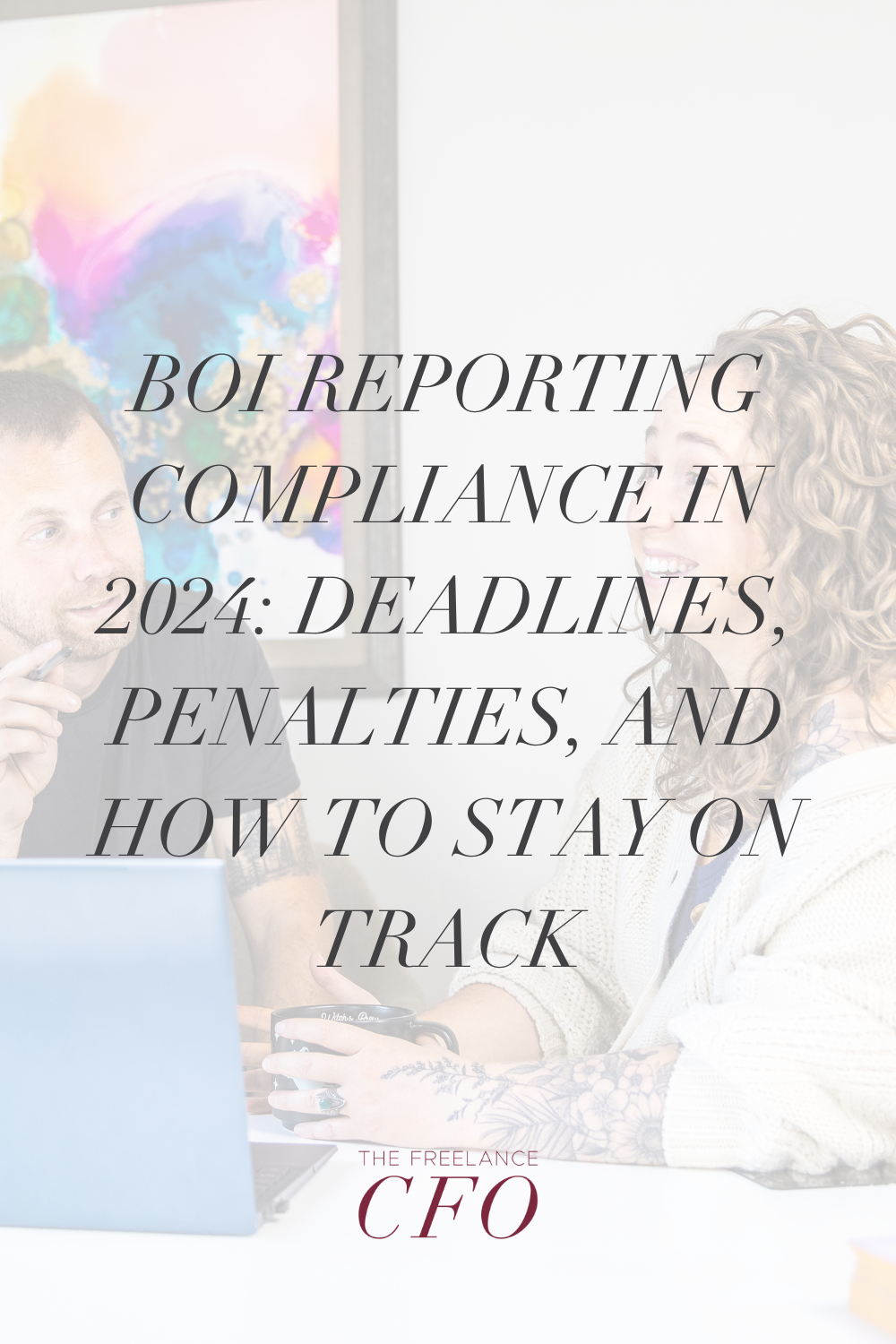Blog: BOI Reporting Compliance in 2024: Deadlines, Penalties, and How to Stay on Track
Disclaimer: Due to ongoing changes in legal challenge, requirements, and regulatory updates, information regarding Beneficial Ownership Information (BOI) reporting may be subject to change. For the most accurate and up-to-date information, please refer to the Financial Crimes Enforcement Network (FinCEN) website directly.
With the new Beneficial Ownership Information (BOI) reporting requirements officially underway, 2024 is the year to ensure your business complies. Whether you’ve been putting it off or just need clarity, we’re here to help you understand the essentials, from deadlines to penalties to practical steps for compliance.
What is BOI Reporting?
BOI, or Beneficial Ownership Information, reporting is part of the U.S. Corporate Transparency Act. This law requires certain companies to disclose details about their beneficial owners—the individuals who directly or indirectly own or control at least 25% of a company. Administered by the Financial Crimes Enforcement Network (FinCEN), BOI reporting aims to prevent the misuse of businesses for illicit activities, like money laundering or tax evasion.
2024 BOI Reporting Deadlines You Should Know
To avoid penalties, make sure you’re aware of these key filing deadlines:
For Companies Formed Before January 1, 2024: The deadline to file your BOI report is January 1, 2025.
For New Companies Formed After January 1, 2024: You have 90 days from your formation date to file.
After January 1, 2025: New entities must file within 30 days of formation.
Does My Inactive or Dissolved Business Need to File?
Not all entities are required to file. If your company is inactive, dissolved, or not in good standing, here’s what you need to know:
Inactive Businesses: If your LLC was set up but never registered with the IRS, conducted business, or maintained good standing with your state, it is likely exempt from BOI filing requirements.
Administratively Dissolved Companies: Entities that have been dissolved or are no longer in good standing typically don’t need to file. However, if your business is reinstated, you will need to comply with the reporting requirements at that time.
Exempt Entities: Some entities are explicitly exempt from BOI reporting, including certain regulated companies, large operating companies, and inactive entities meeting specific criteria.
Understanding Beneficial Ownership: Who Qualifies?
For BOI compliance, a “beneficial owner” includes anyone who:
Owns 25% or more of the company,
Exercises substantial control over the company’s decisions,
Or directly influences the direction and operations of the business.
If you’re uncertain about who qualifies as a beneficial owner, it may be worth consulting a compliance expert to avoid accidental omissions.
Penalties for Non-Compliance: Don’t Wait Until It’s Too Late
With FinCEN’s initial educational phase winding down, 2024 is expected to bring increased enforcement. Failing to file BOI reports on time can result in significant penalties, including:
Daily Fines: Non-compliance can lead to fines of up to $591 per day.
Maximum Financial Penalties: Penalties can reach up to $10,000 for prolonged failure to comply.
Criminal Penalties: Willful failure to file or submitting false information can lead to criminal charges, including up to two years in prison.
In short, don’t delay—compliance isn’t just a box to check; it’s essential for protecting your business from costly fines.
Practical Tips to Ensure BOI Compliance in 2024
BOI compliance can feel overwhelming, but following these tips can help streamline the process and keep you on track:
Verify Your Filing Requirements: Double-check if your business qualifies for BOI reporting. Not every entity is required to file, so if you’re in doubt, consult with a legal or compliance expert.
Gather Ownership Information Early: Collect and verify all beneficial ownership details well in advance. Complex ownership structures can take time to sort through, so don’t leave it until the last minute.
Set Reminders for Deadlines: Mark the relevant deadlines on your calendar to avoid last-minute rushes. FinCEN’s deadlines vary based on your formation date, so plan accordingly.
Utilize FinCEN’s E-Filing Portal: FinCEN’s portal for BOI reporting is designed for ease of use. However, a professional can help with the filing process to ensure accuracy and timeliness.
Consider Our Done-for-You Service: If you’d rather leave it to the experts, our BOI Reporting done-for-you service can handle every step. We ensure your business stays compliant with the latest 2024 standards without the hassle. Book your BOI filing here.
FAQ: BOI Reporting in 2024
What is the deadline for BOI reporting in 2024?
Most corporations, LLCs, and similar entities must file unless they qualify for an exemption. Exemptions cover specific types of companies, including certain regulated entities and inactive entities meeting criteria.
What happens if I don’t file a BOI report?
Failure to file can result in daily fines of up to $591 (up from the original $500), with a maximum penalty of $10,000. Willful non-compliance or filing false information can also lead to criminal charges.
Who counts as a beneficial owner?
A beneficial owner generally includes anyone owning 25% or more of the company or having substantial control over its decisions.
Need Help? Let’s Make BOI Compliance Easy
Staying compliant with BOI reporting can be complex, but it’s a necessary part of running a business in 2024. If you’re unsure of your obligations or just want a hassle-free filing experience, reach out to us for a consultation or book our done-for-you service today. We’ll make sure your BOI filing is accurate and timely, so you can focus on what you do best—growing your business.
Disclaimer: The information provided in this blog is for educational purposes only and does not constitute financial, legal, or tax advice. Reach out to The Freelance CFO team with any questions regarding specific financial concerns, or seek the services of a qualified adviser.



